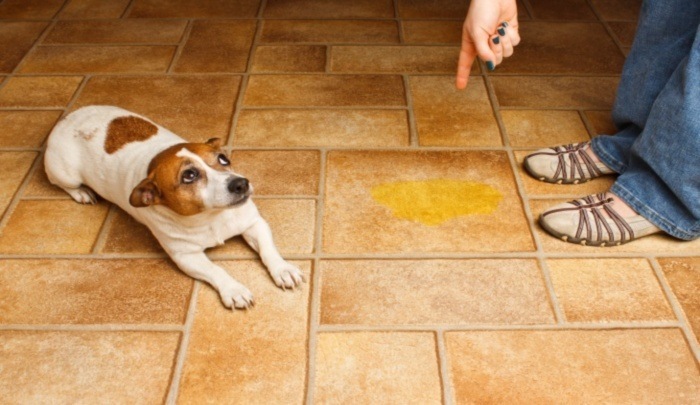Table Of Content

Professional dog trainers have started offering specialized housebreaking workshops and seminars to help dog owners tackle the challenge of stopping their pets from peeing in the house. The demand for eco-friendly pet cleaning products has grown in recent years, with more dog owners opting for natural and non-toxic solutions to clean up accidents and eliminate odors in their homes. [ad_1]Dogs are wonderful companions, but one of the most frustrating behaviors they can exhibit is peeing in the house.

Confine Your Dog When You’re Not Home
To train your dog to signal when they need to go outside, teach them a specific potty cue, such as ringing a bell or sitting by the door. Use positive reinforcement, reward good behavior, and encourage your dog to communicate their needs effectively. With consistent training, your dog will learn to signal when they need to go potty outside. One of the saddest reasons for a dog peeing indoors is fearfulness, no matter how small or big the dog is. Senior dogs especially can develop many conditions that can increase the need to go or lose control of their bladder muscles, which is why dogs pee more often as they age.
How can I treat house soiling related to a behavioral illness?
Start at the beginning, as though your dog were a young puppy, and supervise carefully. Be sure your dog has adequate opportunities to go outside to her appropriate elimination location. It is helpful to have a designated area for elimination, and, when she is brought outside, to guide her to that area before playing with her. Dogs may have issues with eliminating in a place where they should not be, but they also have problems with digging up the yard and the garden, and no one seems to tackle this topic often. Chili powder, or chili pepper, works wonders for keeping your dog(s) away from the household plants.
Proven Ways to Stop Your Dog from Peeing in the House
If you need to be out of the home for longer periods of time it can be a great idea to get a neighbour to pop in so your pooch can have regular potty breaks or if funds allow perhaps find a dog walker. Mix freshly squeezed lemon juice with water in a large bottle and apply onto carpets. A more pleasant smell for humans it will remove any lingering odours while keeping your dog at bay. There are also ones that you can buy that you use on the place you want your dog to pee that actually smells of urine in order to encourage him to go in the correct place. You can also make homemade repellents that work just as well and are much cheaper.
Many medical conditions including diabetes, kidney disease, and others can cause this behavior. By gradually allowing your dog to become accustomed to new things, you can minimize stress and avoid unwanted marking, maintaining harmony within your living space. Ensuring your dog has consistent and frequent opportunities to relieve itself outdoors helps reinforce proper behavior.
Why Is My Adult Dog Suddenly Going to the Bathroom in the House? - Treehugger
Why Is My Adult Dog Suddenly Going to the Bathroom in the House?.
Posted: Wed, 17 Jun 2020 17:35:38 GMT [source]
If this is the case there are products available to discourage dog marking but neutering is the best way to solve the problem for most dogs. The simplest solution is not letting your pooch on the bed until the issue is sorted. Provide a comfortable crate so he feels safe and is still near to you. You also need to remove all odours of previous misdemeanours If your pup can smell his pee he will use that spot again so invest in a special dog urine odour remover.
How to stop your dog from peeing in unwanted spots
Pet owners are increasingly seeking personalized training programs tailored to their dog’s specific needs and behaviors. By working with a professional trainer or behaviorist, pet owners can develop a customized training plan to address their dog’s urination issues effectively. Before attempting to correct indoor peeing through training, it's essential to consult your veterinarian. Indoor peeing might indicate underlying health issues like urinary tract infections or diabetes. If your dog continues to pee inside despite your best efforts, it’s important to seek help from a professional dog trainer or behaviorist.
Yes, medical conditions such as urinary tract infections, bladder stones, diabetes, or kidney disease can cause a dog to urinate in the house. If you suspect that your dog’s urination issues are due to a medical condition, consult with your veterinarian for a proper diagnosis and treatment plan. The time it takes to train a dog to stop urinating in the house can vary depending on the individual dog and the underlying cause of the issue. Consistent training, positive reinforcement, and addressing any medical or behavioral issues can help expedite the training process. Although it’s possible Toby simply needs a refresher course in where to pee, I suspect something else may be going on here. The first priority is to check for a medical issue, so an appointment with your veterinarian is in order.
This is more common in older dogs but can affect dogs of other ages, too. Punishing your dog for accidents in the house can be counterproductive and may cause fear or anxiety. It’s best to focus on positive reinforcement and redirecting their behavior. House training timelines can vary depending on the dog and the training methods used. It’s important to be patient and consistent throughout the process. Some dogs are slightly uneasy and exhibit a range of appeasing postures, sometimes called submissive postures, during greetings.
Arthritis, or inflammation of the joints, causes degenerative changes in the joints that can cause pain when your dog is trying to stand up and walk around. Senior dogs can also suffer from Canine Cognitive Dysfunction, a similar condition to Alzheimer’s in humans. This makes them confused and they may not even remember peeing at all. While trying to housetrain any dog it is important you keep them from being distracted. Avoid playing with them until the business is taken care of they will be much more interested in a game of tug or playing with a ball than going to the loo, and that’s when accidents happen.
Anxiety or stress can sometimes lead to accidents in the house, especially in new or unfamiliar environments. It’s important to address any underlying anxiety issues and provide a safe and secure space for your dog. It’s important to provide your dog with access to fresh water throughout the day to prevent dehydration. However, monitoring their water intake and bathroom breaks can help prevent accidents in the house. Potty pads are another trend that some dog owners use to help prevent accidents in the house. These absorbent pads can be placed in a designated area for your dog to use when they need to go to the bathroom.
If your dog continues to pee inside despite housetraining efforts, you may need to use deterrents to discourage the behavior. Citrus sprays, motion-activated alarms, and bitter-tasting sprays can help deter your dog from peeing in certain areas of the house. If a new pet, baby, or piece of furniture is introduced to the house, your dog may mark the spot where the new pet, baby, or furniture has been. For senior dogs, incontinence typically occurs as they get older, and they don’t always have a history of previous urinary issues.
Neutering or spaying your dog, providing plenty of opportunities for outdoor bathroom breaks, and using deterrents can help discourage marking behavior. While most dogs are fully potty-trained well before they are considered an adult, it is not uncommon to see setbacks in housetraining that can lead to urinary accidents. While “happy peeing” is more common in puppies, adult dogs can still exhibit this behavior.
You will soon come to know what your dog responds to best so use it to your advantage when he pees where you want him to. It can be frustrating to have a dog that pees in the home but it is important to never shout or punish the dog by hitting it if they have an accident. Dogs who behave this way are usually shy or anxious, and may have a history of being punished for having accidents or jumping up on people. If a dog lives in a home where the guidelines constantly change or one person expects different things than another, this can exacerbate any existing stress. Ideally, we would always watch the forecast and take our dogs out before any bad weather hits. These solutions can be particularly helpful when there have been changes in your dog’s environment, such as introducing a new person, when a member of the household moves out, or when moving to a new home.

No comments:
Post a Comment